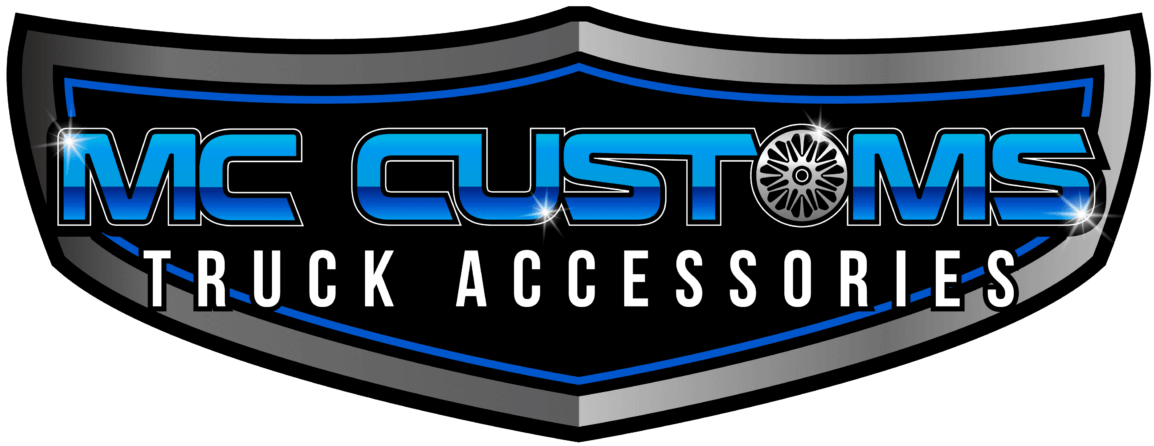
suv, jeep and truck tire guide
January 2024
Welcome to MC Customs Truck Accessories Ultimate Guide to SUV, Jeep and Truck Tires. Within this article you will find information on Mud-Terrain, Rugged-Terrain, All-Terrain, and Highway-Terrain tires. What they are, how they’re defined, pros, cons, and examples of the tires.
MC Customs specializes in all services under the truck accessory umbrella, tire and wheel packages are something we have a lot of experience in. If you have any additional questions or are in the market for new tires and wheels, give us a call or request a quote online today!
Mud-Terrain Tires
Mud-Terrain (M/T) tires are specialized off-road tires engineered to provide traction and durability in challenging terrains such as mud, rocks, and trails. The design of mud-terrain tires is to give optimal performance in off-road conditions, making them an ideal choice for drivers seeking adventure beyond paved roads.
The defining characteristics of mud-terrain tires is in their tread pattern and compound. Unlike all-terrain tires, which balance off-road capability with on-road comfort, mud-terrain tires prioritize aggressive off-road performance. The deep and widely spaced tread is designed to bite into loose surfaces like mud and gravel, providing superior traction. Reinforced sidewalls are another defining feature, enhancing the tire’s resistance to cuts and punctures encountered in rugged off-road environments.
- Off-Road Traction
- Durability
- Self-Cleaning Tread
- Versatility
- Road Noise
- Ride Comfort
- Tread Wear (On Paved Roads)
- Fuel Efficiency
Rugged-Terrain Tires
Rugged-Terrain (R/T) tires, also referred to as hybrid-terrain or rough-terrain, are specially designed to cater to the demanding needs of off-road enthusiasts while maintaining performance on paved roads. These tires create a balance between the aggressive tread patterns of mud-terrain tires and the smoother ride of all-terrain tires, making them an ideal choice for those who want the best of both worlds.
- Aggressive Tread Design: R/T tires have an aggressive tread pattern with a deep and spaced tread pattern. This design is generally less aggressive than M/T tires and more aggressive than A/T tires. The tread design enhances traction on challenging terrains such as mud, gravel, and rocky surfaces, ensuring that your vehicle maintains control even in the most challenging conditions.
- Reinforced Sidewalls: To withstand off-road adventures, R/T tires often feature reinforced sidewalls. This additional strength protects against punctures and abrasions, providing durability and reliability in tough environments. Also making them a great tire for towing and hauling.
- Versatility: R/T tires excel in a variety of terrains, making them a versatile choice for drivers who frequently transition between on-road and off-road driving.
- Off-Road Performance
- Durability
- All-Season Capability
- Road Noise
- Fuel Efficiency
All-Terrain Tires
All-Terrain (A/T) tires are designed to handle a variety of driving conditions, making them an excellent option for drivers who need a tire that can perform well on and off the road. A/T tires are characterized by a tread pattern that features larger, more aggressive tread blocks than standard highway tires. The tread design is intended to provide excellent traction on a wide range of surfaces, including dirt, gravel, mud, and snow.
All-Terrain tires are usually defined by their unique tread patterns and reinforced construction. The design typically includes larger and deeper grooves, widely spaced tread blocks, and an open shoulder. Additionally, most A/T tires incorporate siping technology for improved grip on wet, snowy and icy surfaces. Sidewalls are reinforced to enhance durability and resist punctures.
- Versatility
- Off-Road Capability
- All-Season Performance
- Durability
- Road Noise (Compared to H/T)
- Fuel Efficiency (Compared to H/T)
- Tread Wear (With Frequent Off-Road Use)
Highway-Terrain Tires
Highway-Terrain (H/T) tires are designed to strike a balance between on-road comfort and off-road capability. As the name suggests, they are primarily engineered for highway use, offering drivers a smooth and quiet ride while maintaining respectable performance on light off-road terrains. This makes them an excellent choice for SUVs, Jeeps, and trucks that spend a significant amount of time on paved roads but may occasionally venture onto gravel or unpaved surfaces.
H/T tires are characterized by specific tread patterns and construction that cater to the demands of highway driving. These tires typically feature shallower and closely packed tread blocks, promoting better traction on smooth surfaces while minimizing road noise. The tread patterns often incorporate technology that helps expel water, enhancing wet-weather performance.
- Smooth Highway Ride
- Fuel Efficiency
- Long Tread Life
- Wet-Weather Performance
- Limited Off-Road Capability
- Reduced Traction on Loose Surfaces
- Not Ideal for Harsh Winter Weather Conditions
